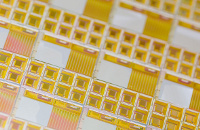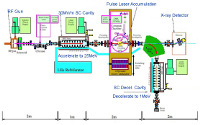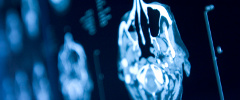From Symmetry Magazine: Particle physics benefits: Adding it up
Stories abound about how particle physics benefits education, the economy, and society as a whole. Quantifying those benefits would help particle physics better demonstrate its value to the country.

The semiconductor industry relies on accelerator technology to implant ions in silicon chips, making them more effective in consumer electronic products, such as computers, cell phones, and MP3 players. Photo: Reidar Hahn, Fermilab |
As a lead machinist at Argonne National Laboratory, Frank Meyer recognized the need for industry to supply complex equipment for scientific research. So in 1966 he started Meyer Tool & Manufacturing on a part-time basis in his garage. Three years later, he left Argonne to expand his machine shop into a full-time manufacturing facility.
Read more...
-- Elizabeth Clements, Fermilab |
 |
|
|
 |
4 April - Tony Hartin
Physics and Mathematics
Physics I enjoyed because it was mysterious, it was about the world and it involved maths...
3 April - Frank Simon
Sun shines at the TeraScale
Particle physicists, including myself, have high hopes that something new, maybe even unexpected, turns up at this new energy scale, which will show us how physics looks like beyond our current understanding.
1 April - Tony Hartin
Kaos (theory) on Wall Street
Is it really true that lapsed physicists who work in financial institutions applying physics to stock market modelling have caused the current world economic turmoil?
31 March - Frank Simon
An Ambush... And some Thoughts about the ILC
Working together across continents and across different cultures and time zones is thus part of the everyday live of particle physicists, something I don’t want to miss.
Follow all Quantum Diaries
|
 |
|
|
 |
Upcoming meetings, conferences, workshops
Joint ACFA Physics and Detector Workshop and GDE Meeting on International Linear Collider
(TILC09)
Tsukuba, Japan
17-21 April 2009
Particle Accelerator Conference 2009 (PAC09)
Vancouver, Canada
4-8 May 2009
11th European Symposium on Semiconductor Detectors
Wildbad Kreuth Conference Center, Bavaria, Germany
7-11 June 2009
ILC-CLIC LET Beam Dynamics Workshop at CERN
CERN, Switzerland
23-25 June 2009
Upcoming schools
Terascale Monte Carlo school 2009
DESY Hamburg, Germany
20-24 April 2009
School on Calorimetry at the International Linear Collider
China Center of Advanced Science and Technology, Beijing, China
22-26 April 2009
|
|
|
GDE Meetings calendar
View complete ILC calendar
|
|
|
 |
ILC: Innovation-Led Cooperation?
Study and brochure highlight potential technological benefits

The many different systems and parts of the ILC are likely to produce technologies beyond fundamental science. |
New science project in their planning stages are a bit of a hothouse for new ideas, innovative solutions and maybe even breakthroughs in technology. The ILC is right in the middle of this stage: R&D is in full swing, scientists pursue various solutions to meeting the high demands of the machine and detectors. No wonder then that people are already thinking of ways to transfer the technologies developed for the different areas of the ILC to other projects or disciplines: medicine, biology, drug research, computing, environment and many others.
Read more...
-- Barbara Warmbein |
 |
|
|
 |
 |
|
|
 |
From Discover Magazine
4 April 2009
Where Do Old Colliders Go to Die?
With the LHC’s ascendancy also comes a seismic shift in the pecking order of particle physics as once-great colliders suddenly become also-rans
Read more... |
|
From Scientific American -60-Second Science
4 April 2009
How Can We Peer Closer to the Beginning of the Universe?
"Within Einstein’s theory of general relativity, the big bang is a singularity—we can’t go beyond that singularity."
Read more... |
|
From Cern Courier
April 2009
Knowledge transfer: from creation to innovation
A study of five LHC experiments – ALICE, ATLAS, CMS, LHCb and TOTEM – provides an insight into how knowledge is generated and transferred as a result of the collaborative nature of scientific and technological processes.
Read more... |
|
From Cern Courier
April 2009
LHC consolidation work proceeds apace
The consolidation campaign for the LHC, which aims to ensure a safe final commissioning and reliable running of the collider is now well under way.
Read more... |
|
From Cern Courier
April 2009
Jefferson Lab starts its 12 GeV physics upgrade
The resulting 12 GeV facility – with upgraded experimental halls A, B and C and a new Hall D – will provide new experimental opportunities for Jefferson Lab's 1200- member international nuclear-physics user community.
Read more... |
|
|
 |
 |
|
|
 |
Technological Benefits from ILC R&D

Quantum Beam Project at KEK will use ILC superconducting RF technology to develop a compact 25 MV SC accelerator with beam current (9mA) and pulse length (1ms) similar to the ILC for medical and pharmaceutical applications |
We are pursuing a very ambitious R&D programme in order to develop the technologies that will be required to build the International Linear Collider. Recognising that important technological benefits are resulting from our ILC R&D programme, the Funding Agencies for Large Colliders (FALC), a group composed of representatives of national science funding agencies worldwide, commissioned a study. The aim was to explore the potential wider benefits of ILC technological developments to industry, the larger scientific community and society at large. The have produced a report, "Technology Benefits deriving from the International Linear Collider," along with a new companion brochure, "Gateway to Technology," being released with this issue of ILC NewsLine, provides informative summaries of some broader benefits to society resulting from our work.
Read more...
-- Barry Barish
Director's Corner Archive |
 |
|
|
 |
Have you transferred?
Do you have an example of technology transfer that is directly linked with work done on the ILC?
Then please let the communicators know about it!
4th POSIPOL Worshop
The fourth edition of POSIPOL workshop series will take place this year from 23 to 26 June at IPNL, Lyon in France.
The workshop addresses the progress realised in the generation of polarised positron sources dedicated to the future
electron-positron colliders (ILC, CLIC, Super B).
New methods, like those using channelling radiation in oriented crystals, being of interest for unpolarised sources,
will also be discussed. The workshop is open to experts in particule and accelerator Physics concerned by the
research and development on future positron sources.
More information at: posipol2009.in2p3.fr
arXiv preprints
0904.0166
Grid porting of Bhabha scattering code through a master-worker scheme
0904.0122
Polarimeters and Energy Spectrometers for the ILC Beam Delivery System
EUROTeV Reports
2008-070
EUROTeV WBCM final report
2008-071
EUROTeV PBPM final report
2008-072
A Prototype S-Band Cavity BPM System for the ILC Energy Spectrometer
2008-073
ILC Crab Cavity Phase Control System Development and Synchronisation Testing in a Vertical Cryostat Facility
2008-074
BDS Deliverable 3: Prototype Intra-Train Feedback Stabilisation and Scanning System
|
|





